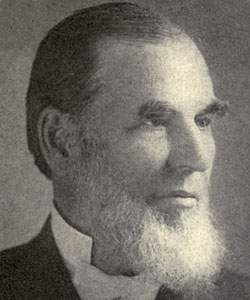Leonard Swett (Appleton's)
Leonard Swett (Eckley, 1999)
Leonard Swett (Chicago Tribune)
At Bloomington he became a close friend of Judge David Davis. In his travels through the Eighth Judicial District in the years between 1850 and 1860 he met Lincoln, often practiced in the same courts with him, and they became the warmest of personal friends. The admiration of each man for the other was genuine and strong.
Judge Davis and Mr. Swett both appreciated Lincoln. They saw that he was the man the Nation needed, and it was largely their efforts which led to Lincoln’s nomination. Mr. Swett was a prime mover in this and was a controlling influence in planning and executing that remarkable campaign which resulted in his nomination and election.
The political prominence which his successful championship of Lincoln brought led to his being the most prominent candidate for Governor of Illinois. He was defeated in the convention by the supporters of all the other candidates, who united on “Dick” Yates. After Lincoln’s election Mr. Swett went to Washington to urge the appointment of Judge Davis to the Supreme Bench. Judge Davis had but a local reputation. He was opposed by O. H. Browning, a man of National repute who had already made his mark in the United States Senate. Lincoln heard Mr. Swett’s plan and said: “But what will I do with you?”
“I’ll give you a receipt in full,” said Mr. Swett, “but if anything ever does come around to me give me something that will pay.”
Leonard Swett, Lawyer (Chicago Tribune)
SWETT AS A LAWYER
As a young man it was said that Mr. Swett greatly resembled Abraham Lincoln in personal appearance. He was tall, angular, and dark, with prominent features strikingly like his great friend’s. The coincidence in physical similitude extended in a considerable degree to the mental characteristics of the two men. He possessed the same class of humor and often employed the same quaint, epigrammatic methods of expressions peculiar to Mr. Lincoln.
As a lawyer Mr. Swett stood in the front rank in the Northwest. His special excellence lay in the direction of the trial of cases and possibly in the handling of criminal cases. As a speaker he had few or no superiors at the bar. He required scarcely any preparation, and he was always ready with imagination, humor, and pathos in abundance. He possessed the subtle power to touch effectively men’s emotional natures.
His first murder case was that of a young man at Shawneetown. The boy had shot down the clerk of the court because the clerk had posted some scurrilous matter about his father. Lincoln had first been engaged to defend the boy, but he had said that Swett was the man to defend that case, and he had come. Among the young lawyers who crowded the courtroom to hear the defense were John A. Logan and Robert Ingersoll. Mr. Swett put in the defense of temporary insanity. It was the first time that defense had been urged in this country, and it was successful.





